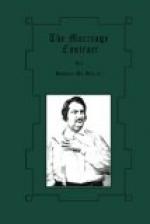“I shall keep them,” said Madame Evangelista.
“You are wrong,” replied Elie Magus. “With the income from the sum they represent you could buy just as fine diamonds in five years, and have the capital to boot.”
This singular conference became known, and corroborated certain rumors excited by the discussion of the contract. The servants of the house, overhearing high voices, supposed the difficulties greater than they really were. Their gossip with other valets spread the information, which from the lower regions rose to the ears of the masters. The attention of society, and of the town in general, became so fixed on the marriage of two persons equally rich and well-born, that every one, great and small, busied themselves about the matter, and in less than a week the strangest rumors were bruited about.
“Madame Evangelista sells her house; she must be ruined. She offered her diamonds to Elie Magus. Nothing is really settled between herself and the Comte de Manerville. Is it probable that the marriage will ever take place?”
To this question some answered yes, and others said no. The two notaries, when questioned, denied these calumnies, and declared that the difficulties arose only from the official delay in constituting the entail. But when public opinion has taken a trend in one direction it is very difficult to turn it back. Though Paul went every day to Madame Evangelista’s house, and though the notaries denied these assertions continually, the whispered calumny went on. Young girls, and their mothers and aunts, vexed at a marriage they had dreamed of for themselves or for their families, could not forgive the Spanish ladies for their happiness, as authors cannot forgive each other for their success. A few persons revenged themselves for the twenty-years luxury and grandeur of the family of Evangelista, which had lain heavily on their self-love. A leading personage at the prefecture declared that the notaries could have chosen no other language and followed no other conduct in the case of a rupture. The time actually required for the establishment of the entail confirmed the suspicions of the Bordeaux provincials.
“They will keep the ball going through the winter; then, in the spring, they will go to some watering-place, and we shall learn before the year is out that the marriage is off.”
“And, of course, we shall be given to understand,” said others, “for the sake of the honor of the two families, that the difficulties did not come from either side, but the chancellor refused to consent; you may be sure it will be some quibble about that entail which will cause the rupture.”
“Madame Evangelista,” some said, “lived in a style that the mines of Valencia couldn’t meet. When the time came to melt the bell, and pay the daughter’s patrimony, nothing would be found to pay it with.”




